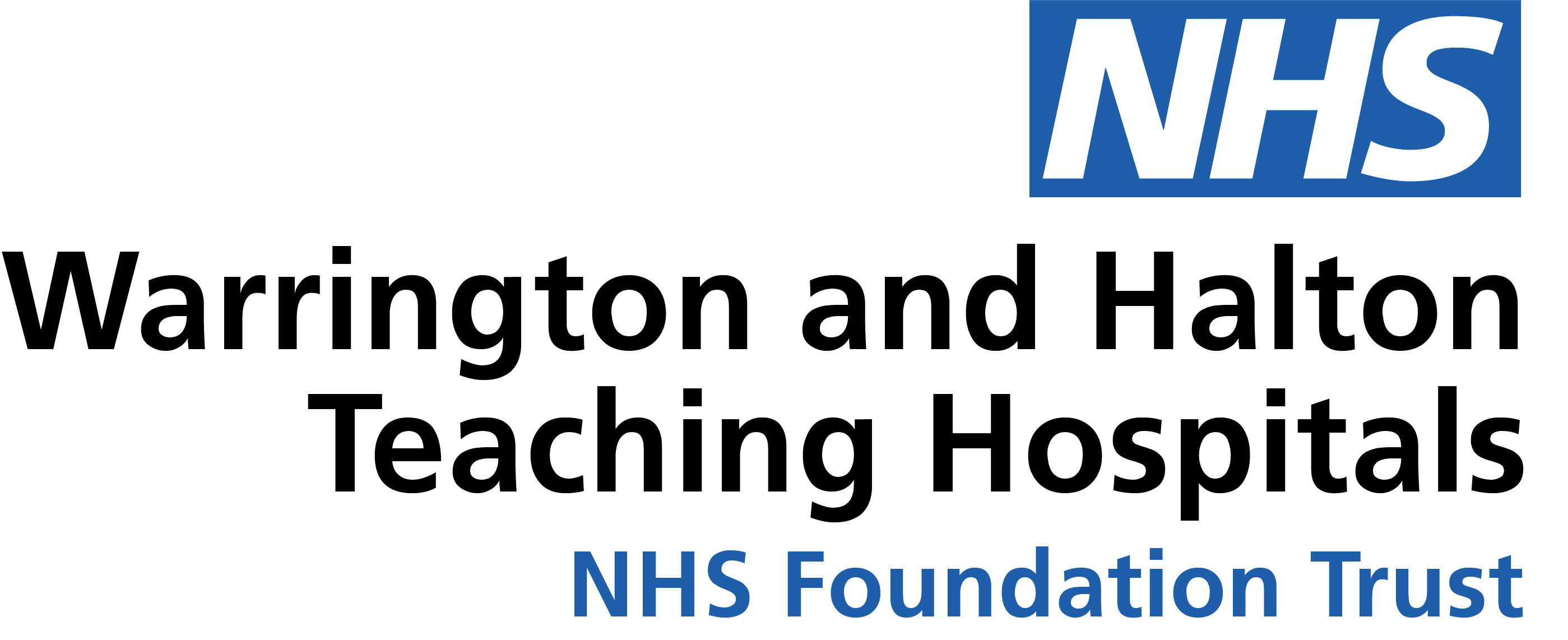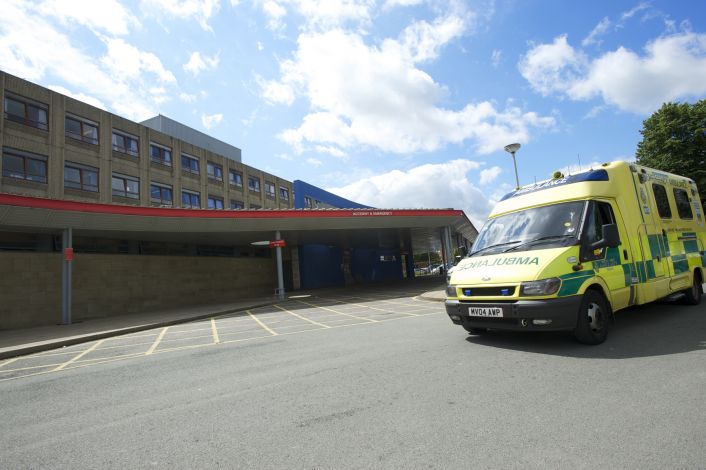Our stroke service strives to achieve high quality patient care. WE provide a comprehensive service which aims to ensure that every stroke patient receives the best care throughout their journey from admission to follow up after discharge.
All stroke patients will be directly transferred to Whiston Hospital for their acute stroke care. Following 24 to 72 hours of stroke care at Whiston Hospital, Warrington and Halton residents requiring ongoing inpatient stroke care will be repatriated.
Our specialist Stroke nurses are available 08.00 – 16.00 Monday to Friday. They book CT head scans, carotid doppler imaging, perform swallow assessments, liaise with the stroke team and list Stroke patients for B14 Stroke unit. The stroke nurses are available for advice to GP’s and other medics or patients during these hours.
The stroke nurses prioritise TIA/Stroke referrals for the stroke consultant clinics and run their own clinics for 6 month stroke follow ups and 4 week TIA follow ups. We offer a telephone triage service for patients who find it difficult to attend clinic as well as nursing home patients. We input ssnap data and oversee the clinical element of the data.
We provide an excellent stroke service at WHH on our 24 bedded acute stroke and rehabilitation unit. The medical team includes experienced stroke consultants and junior doctors. The stroke consultants have daily ward rounds to maintain optimum patient care as well as keeping families informed of their loved ones progress.
Nurses on B14 are trained and experienced in completing swallow assessments as well as delivering individualized stroke care. By working as a multidisciplinary team we ensure the patient is at the centre of a holistic plan of care throughout their stroke journey. Our patients will receive therapy from our highly experienced therapy team.
Therapies include:
Physiotherapy (PT)
Strokes can cause weakness on one side of the body, and can result in problems with co-ordination and balance. Our patients will be seen by a specialist physiotherapist, who will assess the extent of any physical disability before drawing up a treatment plan.
The physiotherapist sets goals in conjunction with the patient and their families. Physiotherapy will often involve several sessions a week, focusing on areas to improve such as balance, muscle strength and coordination. They work closely with the other members of the multidisciplinary team to help the patient to achieve goals and plan discharge from hospital setting.
Our physiotherapists work closely with the ESD and community therapy team to provide a smooth transition when discharged from hospital.
Occupational Therapy (OT)
The team can help people who have had a stroke to regain movement and live independently. They address the physical, cognitive and psychological challenges brought on by stroke. We work very closely with the physiotherapy team to work on regaining movement and we may work on your everyday activities such as getting washed, dressed and kitchen tasks.
The OT will help plan your discharge. As part of the discharge planning an assessment of the home environment may be needed and the OT will identify if any equipment or support is needed to help you manage at home.
Speech and Language Team (SALT)
Speech and Language Therapists can help you if you have communication and/or swallowing problems following a stroke. We work with people who have difficulties with speech, language, reading or spelling following a stroke. We provide assessment and therapy tasks if appropriate to help overcome or adapt to a range of communication problems. This may involve therapy tasks which can be completed with family or friends in addition to work with the therapist. All patients will have their swallow screened by an appropriately trained member of staff on admission to the ward. If you have on-going swallowing, eating or drinking difficulties you will be seen for further assessment by the Speech & Language Therapist.
Appropriate recommendations about safe ways to eat and drink will be made.
Dieticians
Dietitians are an integral part of the stroke multidisciplinary team. Dietitians are healthcare professionals who can assess a patient’s energy, protein, micro and macro nutrient requirements and who can develop effective treatment plans in artificial feeding, modified consistency diets/fluids and food first approaches to help in the management of the stroke patient.
Orthoptist
Visual complications can occur in up to 60% of patients following a stroke or other form of acquired brain injury. They may occur in isolation or combination and if not identified and treated they can cause problems with rehabilitation. Orthoptists are experts in the assessment of these visual complications and are able to assess patients at bedside or in the Outpatients Department within Ophthalmology. We also offer domiciliary visits if required for patients within Warrington, Halton or Widnes. We provide full Orthoptic investigation, diagnosis and treatment or advice. We refer those patients requiring further investigation to the appropriate Ophthalmologist. We liaise with community and hospital Optometrists regarding glasses prescriptions and refer onto Low Visual Aids clinics, and Visual Impairment Teams for support in the home.
The Warrington and Halton ESD service provides outreach and in-reach specialist stroke rehabilitation in the patient’s own home. The team also provides rehab in Padgate house for stroke patients who met the criteria for admission to an intermediate care bed ESD is delivered in conjunction with care provided by social services or private care agencies.
The rehabilitation is then continued by the Halton or Warrington community rehab teams, ongoing rehab can also be offered in neurology outpatient settings at both Warrington and Halton hospitals This service is provided for Halton and Warrington residents who are inpatients in Warrington or Whiston Hospital or sometimes other hospitals if the stroke has occurred out of the patients own area The aim of the team is to facilitate safe, supported, earlier discharges into the community to reduce LOHS, but more importantly, to give patients better functional outcomes.
The team is comprised of Physiotherapists, Occupational therapists and an ESD nurse we can also refer patients quickly to orthoptists and we have access to SALT in the community and some Clinical psychology time. The team started to provide the service in 2009, and has been recognised nationally as delivering a truly effective ESD service and has been featured on the NHS improvement website.
The Stroke Association Stroke Recovery Service provides information, practical advice and emotional support for up to 12 months post stroke. We provide a personalised recovery plan .Together with other professionals, we identify needs of stroke survivors and their carer’s, and plan how these will be met to enable the best possible recovery and support.
We signpost and refer to other agencies and groups ensuring that there is longer term support.
We have our own Stroke Association social support groups and a Communication Support group and Aphasia cafes to help people with communication difficulties following stroke, to help regain their confidence.
We provide grants for items were applicable.
Following discharge from hospital stroke patients will receive a follow up appointment with our Stroke consultant 4-6 weeks post discharge.
Further stroke follow up at 6 months is provided by the specialist stroke nurse. This appointment will be in the WHH outpatient department. The specialist Stroke nurse also offers a telephone triage 6 month follow up service for patients who would have difficulty attending hospital.
We offer a Monday to Friday afternoon rapid access TIA (transient ischaemic attack - mini stroke) clinic. Along with the clinic there is access to treatments such as carotid Doppler’s, vascular surgical intervention, 24 hour access to brain scanning and ECG.
Patients are referred to TIA clinic via the GP, AED doctor, ward doctor or other specialty doctor. The specialist stroke nurses then work with our data administrators to allocate the clinic slots.
TIA’s are categorized using the ABCD2 scoring tool identifying the risk of stroke in the next 7 days. These patients attend TIA clinic with our Stroke consultant for investigations and secondary prevention to help prevent a full blown stroke.


